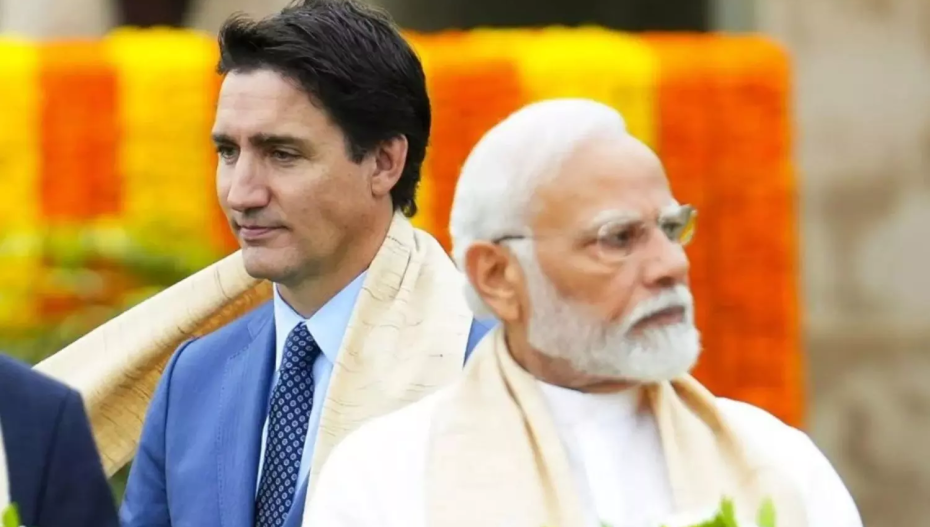Canada has accused the Indian government of involvement in homicide and extortion aimed at silencing critics of India living in Canada, further intensifying a diplomatic dispute that began with the assassination of Sikh activist Hardeep Singh Nijjar last year.
On Monday, Canada expelled India’s High Commissioner, Sanjay Kumar Verma and five other Indian diplomats, accusing them of being part of a criminal network. In response, India expelled six Canadian diplomats, including the chargé d’affaires, Stewart Wheeler.
Tensions between the two nations escalated following the assassination of Nijjar, a prominent Sikh cleric, in Surrey, British Columbia. Prime Minister Justin Trudeau’s government has asserted that the killing was orchestrated by Indian officials, a claim the Indian government strongly denies.
Canada, home to the largest Sikh community outside India, has been investigating the Indian government’s alleged involvement in a campaign targeting Canadian Sikh activists. Many Sikhs in Canada support the Khalistan movement, which seeks an independent Sikh homeland in Punjab, India. The Indian government views the movement as a threat to its sovereignty and has accused Canadian Sikhs of backing secessionist activities.
Prime Minister Trudeau confirmed that he had confronted Indian Prime Minister Narendra Modi about the allegations during a recent summit in Laos, where he sought India’s cooperation in the investigation. However, a follow-up meeting between national security officials from both countries in Singapore failed to yield the desired cooperation, leading to the diplomatic expulsions.
“We will never tolerate the involvement of a foreign government threatening or killing Canadian citizens on Canadian soil,” Mr. Trudeau said, calling it a serious violation of Canada’s sovereignty and international law.
Canada’s Foreign Minister, Mélanie Joly, explained that the six diplomats were expelled after India refused to waive their diplomatic immunity, preventing their participation in Canadian investigations. She described the decision as one taken with “great consideration,” based on “clear and concrete evidence” gathered by law enforcement.
Nijjar was ambushed and killed by three masked men outside a Sikh temple in Surrey last year, and Canadian officials have charged three Indian nationals in connection with the murder. The Royal Canadian Mounted Police (RCMP) revealed that their investigation had uncovered an Indian government network operating inside Canada, allegedly responsible for harassing and intimidating Sikh activists.
The Indian government has stated that it is expelling six Canadian diplomats from India, including the embassy’s second-highest ranking diplomat, the chargé d’affaires, Stewart Wheeler.
The Indian government vehemently denies accusations of its involvement in Mr. Nijjar’s killing and maintains that the allegations against it are politically motivated. It claims that Mr. Trudeau is collaborating with Sikh separatists in Canada because they support his Liberal Party.
Mike Duheme, head of the RCMP, stated that Canada’s law enforcement agencies had charged several individuals for their involvement in extortion, homicide, and other violent crimes targeting Sikhs in Canada. He cited more than a dozen credible threats against members of the Sikh community, adding that some of those involved in the Indian government’s network were coerced, while others were paid to assist.
The Indian government has rejected these accusations, claiming that its diplomats were withdrawn due to an “atmosphere of extremism and violence” that endangered them in Canada. It continues to deny any involvement in Nijjar’s killing, dismissing the allegations as politically motivated and accusing Mr. Trudeau of siding with Sikh separatists who support his Liberal Party.
This diplomatic row comes as Canada’s allies, including the United States and the European Union, seek to bolster ties with India as a counterweight to China. Canada’s accusations, however, have been strengthened by an American investigation into a similar plot targeting a U.S.-based Sikh cleric, which federal prosecutors in New York connected to Nijjar’s assassination.
The growing rift between India and Canada occurs against the backdrop of a wider investigation into foreign interference in Canadian domestic politics. A recent Canadian parliamentary report identified both China and India as key players in foreign meddling, allegations that India has dismissed as unfounded.
India’s government has firmly stood by its expelled diplomats, with the Indian Ministry of External Affairs denouncing Canada’s claims as “ludicrous” and politically motivated.
Also Read: Gujarat Police Arrest 17, Including Four Taiwanese, for ‘Digital Arrest’ Scam













